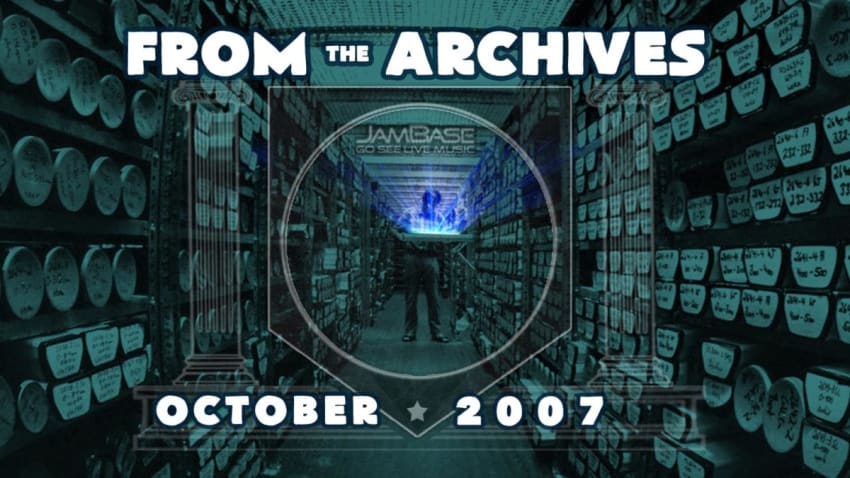The Black Angels: Death Is Salvation
By Team JamBase Oct 30, 2007 • 12:00 am PDT

 |
The Black Angels’ sound is unapologetically psychedelic and dark. Their debut, Passover (released in 2006 on Light In The Attic), is something that you wouldn’t want to find yourself listening to alone in the middle of the night while a thunder storm rages and rumbles outside your windows. Or is it? The record was born from a culture of turbulence in response to the Iraq war while considering the social upheaval of the 1960’s and how it’s all coming back to bite us in the ass today, proving that history does repeat itself and that those who forget the past are condemned to repeat it.
“There is a parallel between now and the ’60s,” says Maas. The themes of war and thought control and their dismal side effects on the public psyche make up part of The Black Angels’ lyrical content. It’s such a parallel that these twenty-somethings frequently see audience members from that era at their gigs, which humbles the whole band. “Older guys in their sixties down here [in Philly] tried to help us load gear on stage. They’re like, ‘We’re just big fans of you guys’ and whatnot. I think maybe they’re like 55. I think it’s cool how like [some people at shows] are like ‘Man, I saw The Doors three times.'”
 |
Johnny Brenda’s, the Philadelphia venue where the Angels performed, has provided the band with an enormous platter piled with an assortment of hummus, oysters and olives from their restaurant downstairs. Since this is Philly, a half assed infrastructure and cut corners are second nature to its citizens. Most live music venues that serve food give musicians the grub that is a hair away from spoiling as an amenity in the green rooms. I learned this the hard way later on that night when I got home and shuddered to think how the band would fare in their van. But, for the moment, the lads get their chow on. After all, when you’re on tour even a Big Mac can seem like a juicy steak from Morton’s.
Most of them hack with a smoker’s cough, and even though their music is rather morose, gloomy, creepy and impending, offstage they’re the most jovial, happy-go-lucky crew of kids you’ll ever meet, smiling and laughing throughout a conversation punctuated by their collective cough, answering each question as if they haven’t been asked it a million times before.
Continue reading for more on The Black Angels…
 |
|
Maas and Bland have been friends since they were children. “We were always into doing creative things and creating different stuff,” Bland recalls before detailing how he and Maas went their separate ways after graduating high school before meeting up again in Austin in November of 2002. “We tried to form bands and we probably went through about 50 different people before we came upon The Black Angels, which started in May of 2004”.
 |
Passover‘s lyrical themes of war, collusion of the mind and paranoia touch on the Vietnam “conflict,” the Cold War and the political fear mongering of today. “The First Vietnam War” is the most potently shocking song on the subject since Alice in Chains’ “Rooster,” which was inspired by AIC guitarist Jerry Cantrell’s father’s experiences in the service during that war. The “first” in title of “The First Vietnam War” suggests the rote of history and serves as a painful reminder that many have forgotten the socio-political lessons of the ’60s. The song is a stark walk through the frontlines, capturing the fear when thing are a little too quiet, waiting while not knowing who is your enemy or where they are lurking. The correspondence between Vietnam and the present Iraq conflict becomes clear when Maas sings, “Sixty thousand men died/ While you were here/ You came into our homes/ And you took our kids/ And you ask for more now/ For this new war.”
 |
The Angels spent the better part of late 2006 and early ’07 touring with The Black Keys through America and Europe, where they were warmly received. “They loved us,” grins Bland, speaking of the European fans. “It’s pretty amazing playing to sold out crowds on a first time tour.”
So far this year, the Angels have toured with Black Rebel Motorcycle Club, VietNam, opened shows for the Smashing Pumpkins and Queens of the Stone Age. They already have 13 songs recorded for their follow-up album and are cutting a split EP with Black Mountain on the Ace Fu label. The Black Angels may be channeling spirits of the past, but this is a band set on conquering the future.
JamBase | Texas
Go See Live Music!
